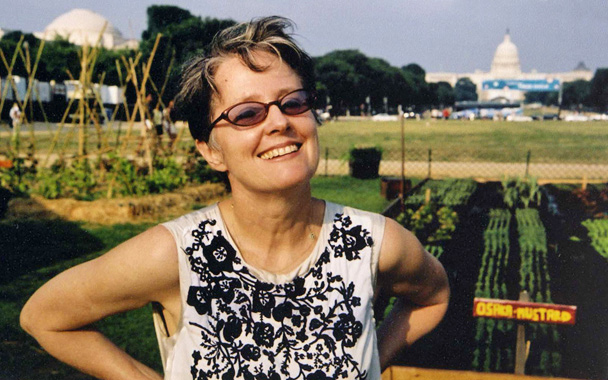One week after Alice Waters returned to California from the inauguration of Barack Obama she got the news: The Obamas had installed a chef at the White House who subscribes to the tenets of the revolution she started: Food should not only taste good, it should also be local, sustainable, and healthful.
Sam Kass, a 28-year-old Chicagoan, who had cooked for the Obamas before they moved to Washington, D.C., is described by the White House as having a particular interest in “healthy food and local food.” And he has spoken passionately about the need to improve school lunches.
At last, after 40 years of working to change the way Americans think about food, Waters appears to have the powerful ally for whom she had been searching.
“I’m delighted,” she says, “but I am not surprised.”
Waters’s contacts with both Obamas during the campaign, for which she raised considerable sums of money, convinced her that she knew something about their values. “I’ve had a feeling all along that they really care,” she says.
During one campaign event in Oakland, California, for which Chez Panisse provided the food, Waters shouted a question at Barack Obama across the swimming pool: “What’s your position on food and agriculture?”
He came around the other side of the pool, Waters remembers, and “he held my hand while he talked to me. He was so interested in the Edible Schoolyard,” a reference to her project in Berkeley that teaches children how to grow and cook healthy food.
“He told me he had read about it and that he had read The Omnivore’s Dilemma, Michael Pollan’s book, but that he didn’t know as much as he should. He did know about the childhood obesity crisis, and he began to cite statistics.”
Waters recalls his exact words: “I’m ready to be educated.” She went back to the restaurant, gathered every book about food she had, and sent them to him.
Waters got equally good vibes from Michelle Obama at a “Women for Obama” fund-raiser in Chicago last summer. “You can’t just make a dinner,” Mrs. Obama told the crowd. “It’s got to be a nutritious dinner, grown with good, fresh, clean food.”
Mrs. Obama said that if they won the election, she would push for healthier food: “It is a message that we have talked about more and more in our household. The food that we put into our children’s bodies—we have seen the impact of it over the course of even a short period of time where we’ve changed how we’ve eaten”— a likely reference to the meals Kass prepared for the family.
With local and sustainable food for the first family and the possibility the Obamas will plant a vegetable garden on the White House lawn, as Waters suggested to them in a letter after the election, she is hopeful that Americans who have not yet gotten the message will follow their new leader and change their eating habits. That, she says, would help fulfill two critical goals: to reduce childhood obesity and to save the environment.
Waters has always been involved in political activities. But by the 1990s, she had learned that if she was ever going to have a real impact, it was not enough to work from the bottom up, converting one person at a time; she needed to work from the top down, too. This realization marked the beginning of an intense, and sometimes disappointing, learning period about the politics of food.
“I wanted a president to acknowledge the need to change the way Americans eat by setting an example, planting a White House vegetable garden. From that point on, I was focused on President Clinton. I talked to everyone who knew him, like Susie and Mark,” she said, referring to her friends the Buells, a well-connected, philanthropic San Francisco couple.
Susie Tompkins Buell, an entrepreneur turned political activist, says she taught Waters “how to network up.” She and her husband, who is chairman of the board of the Chez Panisse Foundation, brought the Clintons to the restaurant.
“I took every opportunity I could get to feed him this idea,” Waters says, “and Susie would invite me to cook for them. But even people who are brilliant don’t really understand the relationship between food and health.”
At President Clinton’s first Chez Panisse meal, in 1993, they talked about a vegetable garden at the White House. Two years later, she wrote to him about a garden and copied the first lady.
Mrs. Clinton replied and said a vegetable and herb garden had been established on the White House roof, big enough for the first family and a friend or two, but not at all visible to the public. It was not what Waters had in mind.
Waters tried again, after President Clinton was elected to a second term, and then again in his last year in office, in a far more forceful letter.
“Mr. President, plant that garden on the White House grounds! ...
“I can think of no more powerful way to ground your legacy than to leave behind you a kitchen garden and the compost pile to nourish it. …”
In his reply, President Clinton mentioned the garden on the roof and said: “We decided that an informal kitchen garden would not be in keeping with the formal gardens of the White House.”
That was more than Waters could take, and she fired off another letter. Apologizing for “being so insistent,” she begged to differ, reminding him that “L’Enfant’s original plan for the capital city was inspired by the layout of Versailles, and at Versailles the royal kitchen garden is itself a national monument: historically accurate, productive, and breathtakingly beautiful throughout the year.”



 Pinterest
Pinterest


